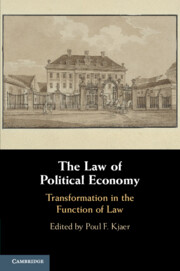Book contents
- The Law of Political Economy
- The Law of Political Economy
- Copyright page
- Dedication
- Contents
- Contributors
- Acknowledgements
- Abbreviations
- 1 The Law of Political Economy
- Part I Studying the Law of Political Economy
- Part II Transformations of the Law of the Globalising Economy
- Part III The Transformation of the Law of Political Economy in Europe
- 8 The Transformative Politics of European Private Law
- 9 Socio-Economic Imaginaries and European Private Law
- 10 The Transformative Socio-Economic Effects of EU Competition Law
- 11 On the Vanishing Functional Autonomy of European Labour Law
- Part IV Towards a New Law of Political Economy
- Index
11 - On the Vanishing Functional Autonomy of European Labour Law
(And Some Dangerous Counter-Movements)
from Part III - The Transformation of the Law of Political Economy in Europe
Published online by Cambridge University Press: 18 April 2020
- The Law of Political Economy
- The Law of Political Economy
- Copyright page
- Dedication
- Contents
- Contributors
- Acknowledgements
- Abbreviations
- 1 The Law of Political Economy
- Part I Studying the Law of Political Economy
- Part II Transformations of the Law of the Globalising Economy
- Part III The Transformation of the Law of Political Economy in Europe
- 8 The Transformative Politics of European Private Law
- 9 Socio-Economic Imaginaries and European Private Law
- 10 The Transformative Socio-Economic Effects of EU Competition Law
- 11 On the Vanishing Functional Autonomy of European Labour Law
- Part IV Towards a New Law of Political Economy
- Index
Summary
In his chapter, Stefano Giubboni endeavours to show the reasons why, starting from the end of the 1980s, the “external” dimension of the functional autonomy of social law in Europe has gradually experienced a seemingly irreversible crisis due to a deep transformation of the political economy of the European integration process and, following the Treaty on European Union (TEU), of the economic constitution of the European Union. In the last decade, such crisis has worsened due to the transformation of the EU and its Member States into, respectively, a strong Liberalisierungsmaschine and Konsolidierungsstaaten – as Wolfgang Streeck evocatively described such process. In the final section of his chapter, Giubboni argues that, in as much as it is impossible to have a common set of fundamental social standards and a unitary welfare state at European level, an almost unavoidable response to the legitimacy crisis affecting the EU consists in giving back to Member States a higher degree of autonomy and “social sovereignty”.
Keywords
- Type
- Chapter
- Information
- The Law of Political EconomyTransformation in the Function of Law, pp. 276 - 296Publisher: Cambridge University PressPrint publication year: 2020

